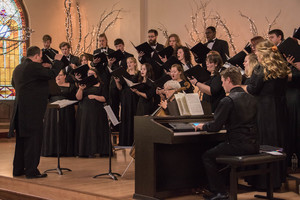Music department earns accreditation through NASM

CHADRON – The sound of clapping in Memorial Hall is nothing new.
However, the recent cheers in that building weren’t directed at performers, instead they were focused on celebrating the Chadron State College music department’s recent accreditation by the National Association of Schools of Music (NASM).
Dr. James Margetts, dean of liberal arts, and Dr. Una Taylor, music department chair, attended the NASM annual meeting in Dallas in late November to receive the good news: CSC was one of five institutions out of 143 applicants to be accredited by NASM.
“The NASM accreditation is truly a great thing,” Margetts said. “It is an assurance to current and prospective students and faculty that we have received the blessing of our peers because we went through the accreditation process. Our reputation cannot be questioned and now we are seen as equals with many high-caliber music schools.”
Taylor said she is both proud and satisfied the music department earned accreditation.
“The NASM organization maintains rigorous standards in every detail, and although there are things we are expected continue to work on and make improvements in order to maintain our accreditation, we meet the standards now,” she said. “I am confident that our department and the administration will continue to support our commitment to maintaining our accreditation.”
According to its website, NASM, which was founded in 1924, is an organization of schools, conservatories, colleges and universities. Currently, it features 648 accredited members. NASM establishes standards for undergraduate and graduate degrees and other credentials for music and its related disciplines.
The process for CSC’s accreditation with NASM took nearly five years, said Margetts, a former faculty member in the music department who became dean in 2014. The accreditation process began in 2012 when Taylor initiated the self-study.
“Una (Taylor) was a key player in CSC gaining this accreditation. Her willingness to work on the self-study was so important. Music faculty teach a lot and meet with students frequently, so it’s hard to find time to get things like that done,” Margetts said.
The self-study answers a series of questions that outline qualifications to meet high professional standards in music departments. The self-study asks for the institution’s financial assets, the type of equipment used by the music faculty, credentials of faculty members, and it gauges the support from the administration and campus services, as well as measuring the rigor of the curriculum.
The music department’s self-study was submitted in 2014 to NASM and a visiting peer group toured campus that fall. At the end of the fall semester, the peer reviewers told CSC there were 18 concerns, or qualifications, that needed to be addressed.
While that number seems high, Margetts said schools rarely reach accreditation on the first attempt.
“A big tenet of NASM is ensuring student wellness and so most of their qualifications dealt with that,” Margetts said. “So an example of one of the things the music department did to meet the qualifications was to install earplug dispensers for student performers in the band rehearsal room.”
Following two additional rounds of responses from CSC where it addressed additional concerns from NASM, Margetts and Taylor waited anxiously for the accrediting body’s decision. During that time, Taylor said they were able to reflect on the positive changes that occurred in the music department – all of which benefitted the students.
“During the process of writing the self-study and examining our programs from every angle, it helped us become a better department,” Taylor said. “The process also helped our administration realize more about what a music department needs in order to function well.”
Now, after receiving accreditation, Margetts said the benefits of it extend across campus.
“To be honest, we really didn’t think about the benefits of becoming accredited,” he said. “The music department has made a lot of improvements and that extends to everything from curriculum to facilities. It is now a better department for students because they have the appropriate rigor and their wellness has been improved. That all works together to make better students and performers.”
Category: Campus News, Music, Student Awards & Achievements

